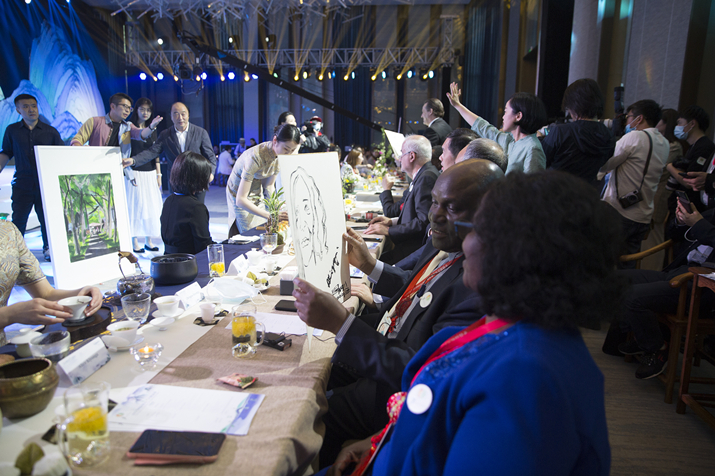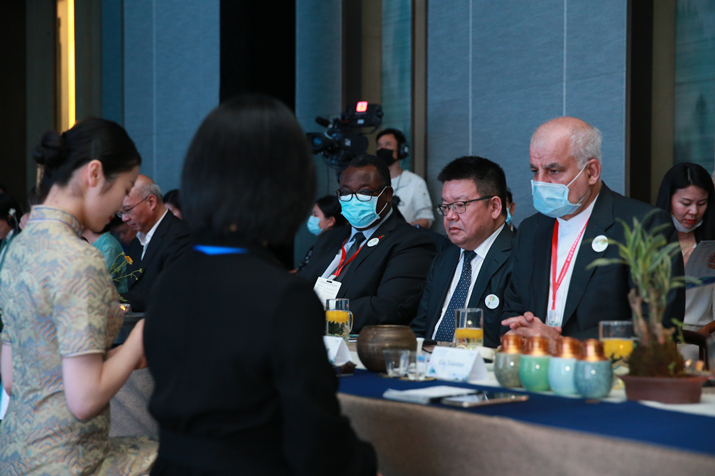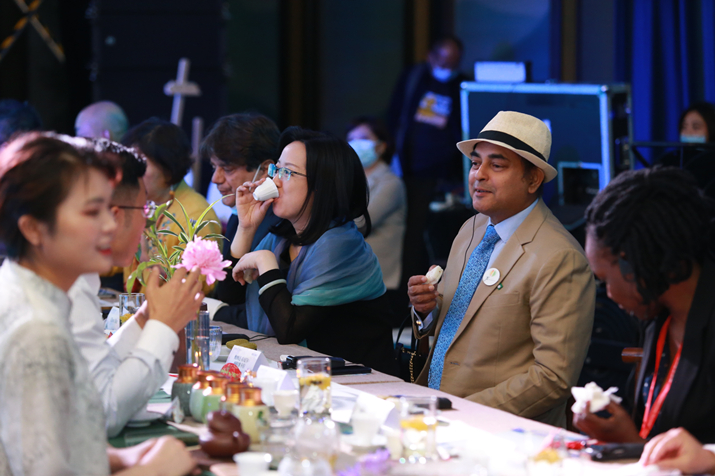|
||||||||||
| Home Nation World Business Opinion Lifestyle ChinAfrica Multimedia Columnists Documents Special Reports |
|
||||||||||
| Home Nation World Business Opinion Lifestyle ChinAfrica Multimedia Columnists Documents Special Reports |
| People-to-people contacts |
| Meet in Hangzhou, China ,to Celebrate the "International Tea Day" in 2021 —— Let the World Drink a Good Cup of Tea |
| Mai Tian, Wang Xiaochuan & Zhang Jiannan 丨Farmers’ Daily ·2021-05-26 |
In Hangzhou, Zhejiang, China, during the 4th China International Tea Expo, some envoys in China and representatives of international organizations in China were invited to gather by the West Lake to witness the development of China’s tea industry, feel the vitality of China’s tea industry, and learn from China’s tea industry Development experience.
respect tea, respect each other, respect the world. Tea lovers from all over the world celebrate the "International Tea Day" in 2021 and go to a splendid "Tea and the World·Common Tasting Sharing" theme event, to experience the charm of Chinese culture in the fragrance of tea and to make tea together Talk about a bright future for the development of the global tea industry.
Friends come from afar, and China treats guests with tea.

The Ugandan ambassador to China and his wife admired the character sketches created by Chinese painters (MI JIA & HUANG XINYAN)
An international event to showcase the Chinese tea industry
Hangzhou is the permanent venue of the China International Tea Expo. This year's Tea Expo not only innovated the exhibition format, but also the number of exhibitors and the exhibition area have increased significantly compared with the previous one. It can be said that there is an unprecedented gathering of tea companies.
In the tea exhibition halls all over China with unique design and strong local characteristics, the envoys and representatives of international organizations in China watched carefully and listened carefully. They were attracted by the different varieties and packages of Chinese tea in front of them. They praised the development of China's tea industry from time to time. The achievements made are highly praised for the positive role played by the tea industry in China's poverty alleviation.
In the Fujian exhibition area, the words "Beautiful Wuyi Mountain, Smart Minjiang Water" displayed on the big screen attracted the Burkina Faso ambassador to China Adama Com?paore to stop and admire it.
"I know Fujian tea. Dahongpao and jasmine tea are very famous in the world. I especially love jasmine tea. China." Adama Compaore said, picking up a can of Fuzhou jasmine tea.
"In the past, these small green leaves were nothing more than ordinary crops in the mountains and plains; now, they are the'golden leaves' that can make Chinese farmers rich, and it is our pillar industry to promote rural revitalization." Fujian Pavilion Relevant persons in charge introduced to the envoys.
The person in charge gave an example. Tanyang Village, Shekou Town, Fu'an City, is a village that mainly grows tea. During his work in Ningde, Xi Jinping came to this village four times and asked the locals to grade tea according to local conditions, plant them in slices and scales, scientifically manage them, and brand them. He also urged the locals to improve tea varieties and improve the quality of tea. Today, more than 80% of the population in Tanyang Village is involved in tea, and in 2020, the per capita disposable income will exceed 20,000 yuan.
The story of Tanyang Village was thriving and rich because of tea, which caused the envoys to nod frequently.
In the Zhejiang exhibition area, in addition to the famous Longjing tea, the envoys also tasted some new varieties and new flavors of tea. They all gave their thumbs up and praised: "The tea has a unique taste and a good taste."
"I once went to Zhejiang to conduct field investigations, from choosing which tea species to cultivate, to cutting, managing and protecting and collecting, to processing, packaging and sales. The locals took the consumer market as the goal to expand tea culture, tea industry, and tea technology. This big article has formed a mature industrial operation system, which not only wins the market, but also helps tea farmers get higher and higher incomes.” said Hernan Viola, Agricultural Counselor of the Argentine Embassy in China, “ A piece of green leaf benefits the people of one place, and China’s experience is worth learning from developing countries."

The diplomatic envoys in China are watching a tea art performance (MI JIA & HUANG XINYAN)
An audiovisual feast to appreciate Chinese tea culture
On the "International Tea Day" on May 21st, there were many talents and friends, and an audio-visual feast for the envoys to appreciate Chinese tea culture came as scheduled.
Beautiful stories start from encounters.
Tea originated in China and prevailed all over the world. Thousands of years ago, Chinese people and tea met in the forest: tea was ignited by human hands and bloomed with ever-changing mellow fragrance; people were conquered by the beauty of tea and regarded it as a symbol of virtue and a happy life.
In the place where humans first discovered wild tea trees, in the mountains of Yunnan, China, the people of the Blang people have grown tea for generations, connecting the ancient wild tea trees into ten thousand acres of green tea forests, and finally turning them into a cup of quaint and mellow Pu'er tea soup.
Looking at the picturesque sea of clouds and tea mountains on the screen, listening to the Blang girls singing and singing on the stage, the envoys were intoxicated and immersed in it. They picked up a cup of tea from time to time, and savored the poetry and timelessness of the tea culture of the great eastern countries while drinking slowly.
"I love Pu'er tea not only because it has a mellow taste, but also because it has a health care effect. Therefore, whether at home or in the office, I always keep Pu'er tea and make a pot of it almost every day." On the topic of which kind of Chinese tea is my favorite, Uganda's ambassador to China Chrispus Kiyonga is very fond of Pu'er tea produced in Yunnan, China.
The habit of Chinese people to drink tea flourished in the Tang Dynasty and flourished in the Song Dynasty. In the Tang and Song Dynasties, there were tea parties and tea banquets, both of which were elegant social methods. People sublime tea drinking into a dual enjoyment of material and spirit. At the tea banquet, people prepared delicacies, looked for a place with great scenery, and enjoyed tea together, and expressed their understanding of tea through poems, books, and paintings. The scene was extremely elegant.
Since then, writing poems and paintings has become a common configuration at various tea parties in China. During the "Esemester Tasting" session on the day, the envoys not only tasted Sichuan red, Liubao tea, Mengdingshan tea and Hongya green tea, but Chinese calligraphers and painters also splashed ink on the spot, allowing the envoys to China to use Chinese calligraphy and freehand brushwork. In the landscape painting, feel the profoundness and profoundness of Chinese culture.
"The word'Encounter of Tea and Wine' is very well written and has a profound meaning. It is like the encounter of tea and wine. It represents the blending and collision of Eastern and Western cultures, and reflects what the Chinese call'harmony without difference The spirit connotation of the United States and the United States." Carlos Watson, the representative of the United Nations Food and Agriculture Organization in China, said that the "International Tea Day" initiated by China and established by the United Nations is a common holiday for tea lovers around the world. Countries should take advantage of this opportunity , To accelerate the development of the tea industry and promote tea trade to play a more important role in the world economic structure.

The diplomatic envoys in China are communicating with each other (MI JIA & HUANG XINYAN)
A cloud communication meeting for tea lovers around the world
Tea-This magical oriental leaf has been a friendly messenger between China and the world since ancient times. Today, with the rapid growth of global tea consumption and the steady development of tea trade, tea has been given more meaning.
In order to gather tea lovers from all over the world to celebrate the "International Tea Day" in 2021, a cloud tea party was staged at the Tea Research Institute of the Chinese Academy of Agricultural Sciences located in the West Lake Scenic Area of Hangzhou, attracting tea lovers from 26 countries across the world. In harmony with the space, gather in the clouds to enjoy the tea fragrance.
Cloud Tea will present Chinese tea culture to tea lovers around the world in a visual, concrete and perceptual form. Through the dissemination of scientific tea drinking and the promotion of the health functions of tea, more people around the world can learn about tea and love tea, and share the tea culture of various countries, thereby expanding the influence and consumption power of tea in the world.
"It's not that you look old, but that you drink too little tea." Focusing on the topic that drinking tea is good for physical and mental health, Liu Zhonghua, an academician of the Chinese Academy of Engineering, aroused a round of applause from the audience and a wave of barrage from the online audience.
Advise you to drink more tea, and persuade you to be more natural. Drinking tea is a physical and mental enjoyment, and appreciating the process of making tea is a spiritual enjoyment that cultivates sentiment.
The Yuncha Club invited a number of Chinese national-level non-genetic inheritors. They displayed the fresh and refreshing Taiping Houkui, the delicious Fuding white tea, the fragrant Dahongpao and the mellow Dian black tea and other famous Chinese tea systems online. Tea craftsmanship has feasted the eyes of offline and online audiences.
The craftsmen uncovered the hard-won from a leaf to a good cup of tea one by one, and showed the world the artisan spirit of Chinese tea masters and the persistence and perseverance of promoting Chinese tea culture to the world with superb tea making skills.
If the masters of tea maker let people see how professional good tea was "born", then the folk tea making methods of various countries in the world show people the different tea customs that Chinese tea has changed after going abroad.
The Hakka Lei Tea of Gannan in China and the Three Teas of the Bai Nationality in Yunnan belong to the national intangible cultural heritage, with far-reaching historical origins and cultural heritage, as well as strong national characteristics. At the scene, the special production methods and health benefits of Lei Cha have made foreign netizens still unfinished, and the profound philosophical implication of the Bai nationality's three teas, one bitter, two sweet and three aftertastes, is even more enlightening.
Through the cloud connection, the exotic customs and tea-drinking customs of Malaysia, Russia and other countries are refreshing. The process of making pull tea in Malaysia is as if the beating notes are unforgettable when the hands are up and down; the Russian samovar has the same origin as the Chinese Inner Mongolia milk tea, which not only retains the Chinese tea drinking elements, but also combines the country’s climate characteristics and diet. The characteristics are changed.
"This allows us to understand more deeply that tea originated in China. In the process of spreading to different countries, through the fusion and collision with local folk culture, it derives tea culture with national characteristics." There are foreign netizens on the screen. Leave such a text on.
Is the so-called "harmony without difference, beauty and beauty together; tea and the world, sharing development". With its unique economic, social and cultural value, tea closely connects 3 billion tea-drinking populations in more than 160 countries and regions around the world.
Tea is destined, but drinking is boundless. We believe that the future of tea will be better.
| About Us | Contact Us | Advertise with Us | Subscribe |
| Copyright Beijing Review All rights reserved 京ICP备08005356号-5 京公网安备110102005860号 |